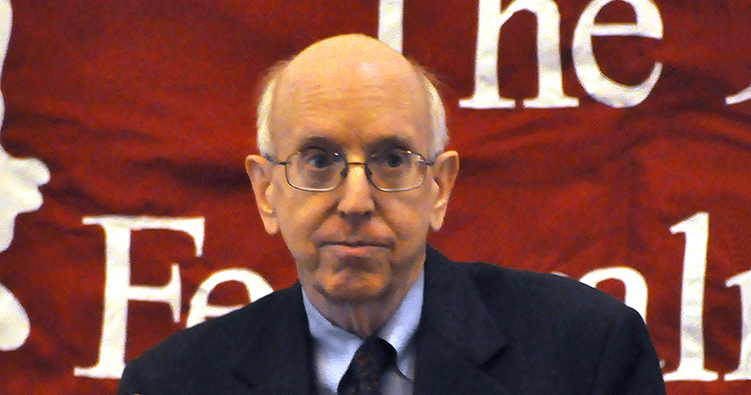Richard Posner's lawyer says the retired judge has Alzheimer’s, didn’t have capacity to contract

Richard Posner, a retired judge on the 7th U.S. Circuit Court of Appeals at Chicago. Photo by chensiyuan, CC-BY-SA-4.0,3.0,2.5,2.0,1.0, via Wikimedia Commons.
Richard Posner, a retired judge on the 7th U.S. Circuit Court of Appeals at Chicago, didn’t have the capacity to enter into a contract because of Alzheimer’s disease, his lawyer said in a letter obtained by Reuters.
Lawyer Robert Kaufman of Fischel Kahn made the claim in a letter to Brian Vukadinovich, who is seeking payment for his work as co-executive director of Posner’s pro bono litigation group, Reuters reports.
Posner received an Alzheimer’s diagnosis about six months after his September 2017 retirement, according to the letter reviewed by Reuters.
“We believe medical evidence will show that the judge did not have the legal capacity to enter into contracts in 2018,” the letter said. Posner “has long since been moved to a nursing facility,” Kaufman said.
In any event, Kaufman said in the letter, any contract for services would have been an obligation of the pro bono group, not an individual obligation of Posner.
Vukadinovich forwarded an email to Reuters in which Posner said he thinks that he can raise more than $1 million in donations for his Posner Center of Justice for Pro Se’s.
“I will not take any of it for myself because my wife and I have ample savings and low expenses,” the email said. “I should be able to pay you at least $80,000 a year, and I hope more.”
Vukadinovich told Reuters that Posner later promised to pay him $120,000 per year. Vukadinovich said he is owed $170,000 for his work from February 2018 to July 2019, when the center closed. He told Posner and Kaufman that he is prepared to file a lawsuit if he doesn’t receive payment.
Jonathan Zell was the other co-executive director of the center. He told Reuters that the center had $8,000 in debt and a bank account balance of $8,800 when it closed. He said Posner disclosed his Alzheimer’s diagnosis to staff members but said the disease doesn’t affect him.
Zell said Posner could “put on a good show” through friendly interactions, at least in the beginning. But “of course,” Alzheimer’s did affect Posner, Zell said.
In October 2017, Posner first sought permission to represent pro se litigant William Bond as a pro bono “advisory counsel” in a federal appeal. Posner and a co-counsel, Matthew Dowd, later filed briefs on Bond’s behalf. The 4th Circuit at Richmond, Virginia, refused to allow Bond to amend his tossed lawsuit, and the U.S. Supreme Court denied cert.
The December 2018 cert petition was filed by four lawyers, including Posner, Dowd and Boies Schiller Flexner chair David Boies.
Dowd told Reuters that he couldn’t comment on Vukadinovich’s dispute.
“I can say that it was an honor and pleasure to work with Judge Posner on our 4th Circuit appeal,” Dowd said. “I still believe our appeal had much merit.”
Bond supported Posner in an email to the ABA Journal.
Bond said neither he nor anyone on his legal team knew of Posner’s diagnosis until well after the conclusion of the 4th Circuit litigation in summer 2018.
Bond said Posner was admitted to the 4th Circuit bar after an interview with the clerk’s office via a senior court official.
“Our CA 4 brief is considered one of the finest by Ross Guberman, who teaches all new Article IIIs” at the Federal Judicial Center, he said.
Updated March 30 at 10:40 a.m. with additional information from William Bond. Updated March 30 at 4:15 p.m. to remove the last sentence.
Write a letter to the editor, share a story tip or update, or report an error.


